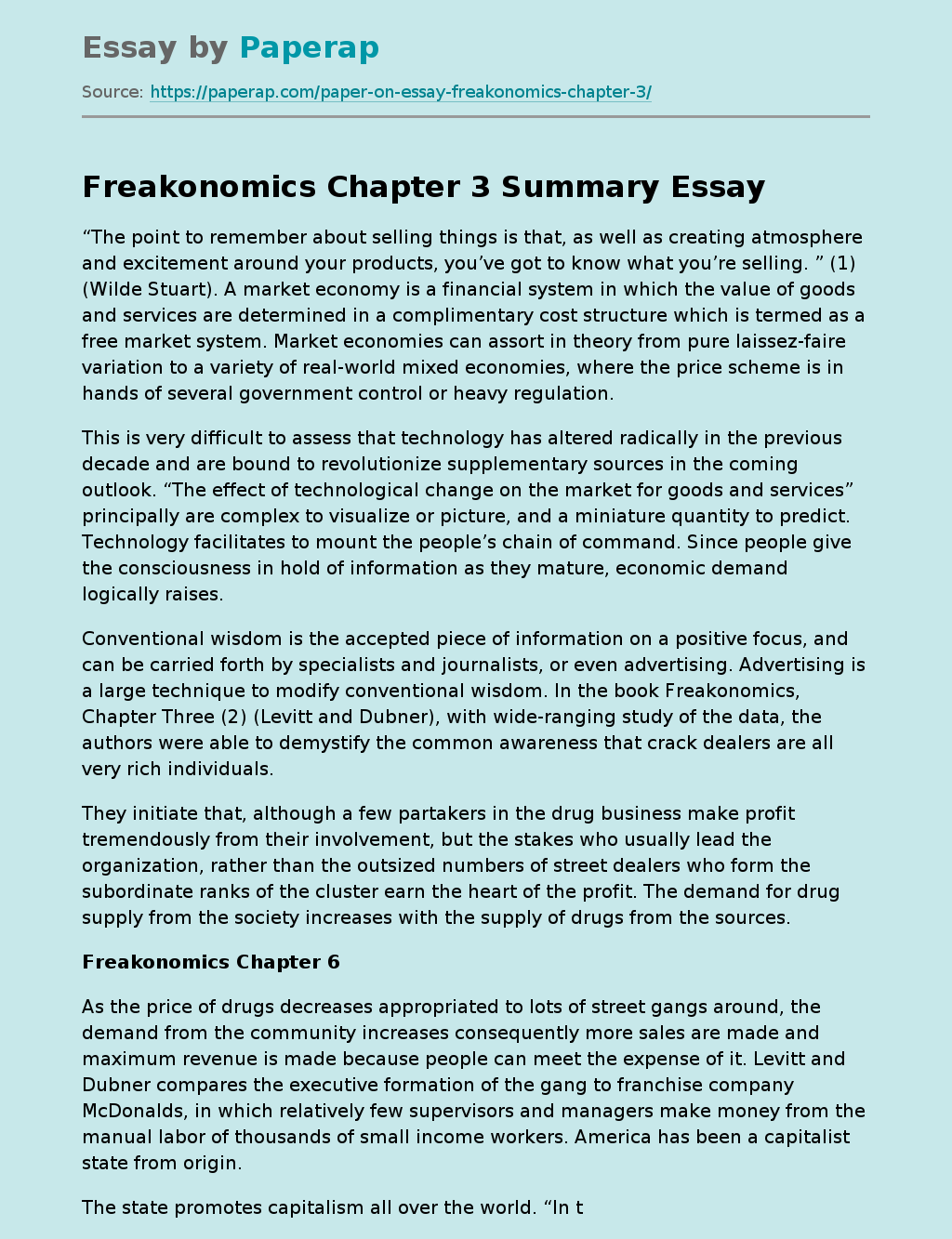Freakonomics Chapter 3 Summary
“The point to remember about selling things is that, as well as creating atmosphere and excitement around your products, you’ve got to know what you’re selling. ” (1) (Wilde Stuart). A market economy is a financial system in which the value of goods and services are determined in a complimentary cost structure which is termed as a free market system. Market economies can assort in theory from pure laissez-faire variation to a variety of real-world mixed economies, where the price scheme is in hands of several government control or heavy regulation.
This is very difficult to assess that technology has altered radically in the previous decade and are bound to revolutionize supplementary sources in the coming outlook. “The effect of technological change on the market for goods and services” principally are complex to visualize or picture, and a miniature quantity to predict. Technology facilitates to mount the people’s chain of command. Since people give the consciousness in hold of information as they mature, economic demand logically raises.
Conventional wisdom is the accepted piece of information on a positive focus, and can be carried forth by specialists and journalists, or even advertising. Advertising is a large technique to modify conventional wisdom. In the book Freakonomics, Chapter Three (2) (Levitt and Dubner), with wide-ranging study of the data, the authors were able to demystify the common awareness that crack dealers are all very rich individuals.
They initiate that, although a few partakers in the drug business make profit tremendously from their involvement, but the stakes who usually lead the organization, rather than the outsized numbers of street dealers who form the subordinate ranks of the cluster earn the heart of the profit.
The demand for drug supply from the society increases with the supply of drugs from the sources.
Freakonomics Chapter 6
As the price of drugs decreases appropriated to lots of street gangs around, the demand from the community increases consequently more sales are made and maximum revenue is made because people can meet the expense of it. Levitt and Dubner compares the executive formation of the gang to franchise company McDonalds, in which relatively few supervisors and managers make money from the manual labor of thousands of small income workers. America has been a capitalist state from origin.
The state promotes capitalism all over the world. “In the 18th century, after the Industrial Revolution in England and other European countries, the importance of capital as a means of production increased and this resulted into the origin of a new economic system” (3) called Capitalism. The merits of the capitalist mode include rich variety of goods and services, proper use of resources, private ownership, efficient production, raise standard of living, economic freedom and growth of entrepreneurship.
The economic quarrels for drug legalization says, permit drugs and make tax revenue. Any reduction in the price of drug control because of lower law enforcement expenses will be counterbalanced by much higher costs on public health due to the pitch of drug use. The transaction of the illegal drugs constructs an incursion of dollars that is outside the official economy, and keeps stress on the currency exchange making the dollar low and making the export of legal products further complicated.
The drug dealers have less economic incentives to participate in risky and low paid work but they believe that one day in the future, they would reach the top position on the gang which keeps them on this kind of business. The demerits of the capitalist society include asymmetrical distribution of profit earned, status struggle, labour exploitation, lack of organization, business fluctuation and wasteful struggle. This link proved to be principally appropriate when the authors found that most street dealers made a lesser amount of than minimum wage, while also keeping in mind of the danger of death.
Normally, a business desires a new production technique because they experience out of the market, as though they are in lose of money already and they want to avoid increasing the value. Cocaine was expensive therefore cheap form of cocaine known as crack was invented. .This invention comprised an important technological transform in the supply of cocaine. The market seemed content with the price which meant people obtained crack at a lower price and demand quickly increased.
Cheap production would theoretically consent to the price of the product to drop. However, most would assume that the invention actually has a cost to purchase. In an event, one would encounter the company powerless measure to shell out for the invention upfront. For example, if a construction engine allowed the company to dismiss 60% of its labour, but their salary which the company would now have to keep, didn’t cover the cost of the construction engine.
The company could think of slightly increasing its prices, either provisionally or lastingly to cover these costs. The impact of an invention would depend on the price allocated to the product. The lower the price, the better the demand. Than the possibility would be that, they beat into their savings in trying something completely new or obtain a bank loan. Large quantities of companies are not enthusiastic to lower the price of the product after they already situated it.
Freakonomics Chapter 3 Summary. (2019, Dec 05). Retrieved from https://paperap.com/paper-on-essay-freakonomics-chapter-3/

